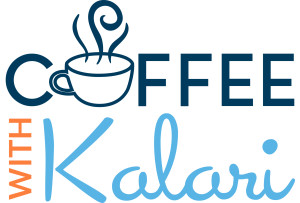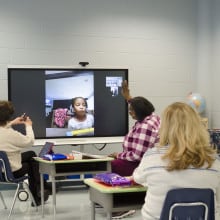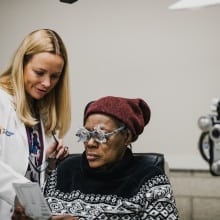Coffee with Kalari: What is World Braille Day?
This article is part of a weekly series written by Kalari, a writer, athlete, mother and employee of The Chicago Lighthouse who is visually impaired. She shares her perspective on a variety of topics in order to build community.

World Braille Day is celebrated every year on January 4th, which is Louis Braille’s birthday, who is the inventor of braille. Before Louis Braille, individuals who are blind had no real opportunities to gain literacy and independence. This invention has opened a world of inclusiveness in our society for individuals who are blind.

With the help of legislation, braille has made leaps and bounds in the fight for inclusiveness, but still more work needs to be done. For example, there are some restaurants that have braille menus but many of them do not. I am happy to say that despite restaurants not having physical menus that are accessible, many of them do have accessible apps or websites which enable individuals who are blind or visually impaired to access their menus through a phone or tablet. I recognize that this is not an equal substitute and that reading a menu through your phone is very different from physically reading a menu, but it is a step in the right direction. I remember that just a few years ago, there were fewer restaurants with braille menus or accessible apps and websites, which was quite discouraging. The only way I was able to find out what was available at these restaurants was either through my sighted counterparts or through the server, so it is empowering to be able to order independently at more restaurants today.
It is great to know that if braille is not available, then online accessibility is a viable option for sharing information with people who are blind or visually impaired. This is not just true for restaurants, but also for many other types of businesses. Most banking institutions, for example, now have accessible online apps. The advances of technology have leveled the playing field for those who have vision impairments and continued the fight for inclusiveness where braille left off.
Even though great strides have been made when it comes to online accessibility, there are still many companies do not have accessible websites. I am happy that The Chicago Lighthouse is leading the fight to make the web more inclusive of people with disabilities through our Digital Accessible Experience team (DAX). Jose Martinez, the Lead Analyst for DAX, strongly feels that increased online accessibility is the only way people who are blind or visually impaired can continue to progress in society. “Web accessibility is a lifeline to people like us. It is a major reason why we are employed. It has grown only more imperative due to the pandemic, and I feel this is the way forward, regardless of what happens,” he says.
I would love to know how you feel about online accessibility and its impact on braille. Do you feel that braille will ever be phased out by advances in technology? I would love to hear your thoughts!





